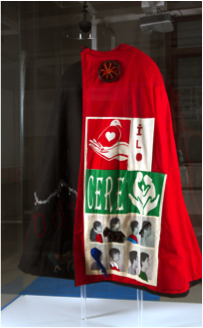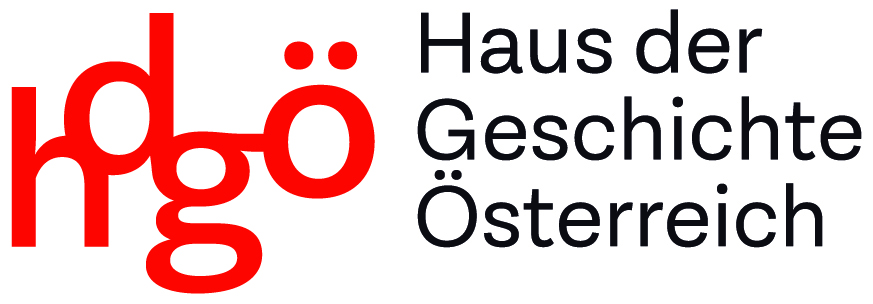VWI invites/goes to...
Cycle of VWI Fellows’ Colloquia
The VWI fellows present their intermediary research results in the context of colloquia which are announced to a small audience and are open to a public audience with an academic and topical interest. The lectures are complemented by a response or commentary by an expert in the given field and are discussed with the other fellows.
Due to the previous lack of an appropriate space, the colloquia were held at other Viennese research and cultural institutions with a topical or regional connection to the given subject. From this circumstance was born the “VWI goes to …” format.
With the move to a new institute building at Rabensteig 3, the spatial circumstances have changed, so that the VWI is now happily able to invite other research and cultural institutions. Therefore, the VWI is now conducting its colloquia both externally and within its own building, in the framework of continued co-operation with other institutions.
The new cycle of fellows’ colloquia “VWI invites/goes to …” is not only able to reach a broader circle of interested persons, but moreover integrates the VWI further into the Viennese scholarly establishment, perhaps even crossing borders into the greater regional research landscape.
| VWI invites/goes to... | |||
| Ari Joskowicz: Getrennte Erfahrung, geteilte Erinnerung: Eine Beziehungsgeschichte von Jüdinnen/Juden und Romnija/Roma von der NS-Zeit bis heute | |||
Thursday, 27. January 2022, 15:00 - 17:00 Haus der Geschichte Österreich, Neue Burg, Heldenplatz, 1010 Wien
|
|||
VWI goes to hdgö
Kommentiert von Cornelia Kogoj Ari Joskowicz ist Associate Professor für Jüdische Studien und Geschichte an der Vanderbilt University und Senior Fellow am Wiener Wiesenthal Institut. Er publizierte u.a. zum jüdischen Antiklerikalismus (The Modernity of Others: Jewish Anti-Catholicism in German and France, Stanford University Press 2014) und zur Geschichte der Roma/Romnija. Er arbeitet zurzeit an einem Buch zur Beziehung von Romnija/Roma und Jüdinnen/Juden während und seit dem Holocaust. Cornelia Kogoj ist Generalsekretärin der Initiative Minderheiten und Mitkuratorin der Ausstellungen Gastarbajteri. 40 Jahre Arbeitsmigration (Wien Museum, 2004) und Romane Thana. Orte der Roma und Sinti (Wien Museum, 2015). Sie ist gemeinsam mit Christian Kravagna Autorin von Das amerikanische Museum. Sklaverei, Schwarze Geschichte und der Kampf um Gerechtigkeit in Museen der Südstaaten (Mandelbaum Verlag, 2019) verfasst. Anschließende Kuratorenführung zur Frage der Darstellung der Verfolgung von Jüdinnen/Juden und Romnija/Roma in Ausstellungen – mit Stefan Benedik in der hdgö-Hauptausstellung Neue Zeiten: Österreich seit 1918. Die Teilnehmer/innenzahl ist coronabedingt auf 25 Personen beschränkt und die Veranstaltung wird auch online übertragen: https://us02web.zoom.us/j/87613396357?pwd=dm9IdStuZDVPODA3eUNZSlkwSWtsQT09 Mit der Teilnahme an dieser Veranstaltung stimmen Sie der Veröffentlichung von Fotos, Video- und Audioaufzeichnungen zu, die im Rahmen der Veranstaltung entstehen.
"Bitte melden Sie sich unter This email address is being protected from spambots. You need JavaScript enabled to view it. bis 26. Jänner für die Präsenzveranstaltung an und bringen Sie einen gültigen Lichtausweis mit! Für die Veranstaltung gilt 2G+ (vollständig geimpft oder genesen und zusätzlich in den letzten 48 Stunden PCR- getestet) sowie FFP2-Maskenpflicht"
Foto: Mantel, mit dem sich eine Wiener Schulklasse bei der Auschwitz-Überlebenden Ceija Stojka für ein gemeinsames Projekt bedankte. © Markus Guschelbauer/hdgö
|
|||







 Vor den 1930er Jahren hatten Jüdinnen/Juden und Romnija/Roma fast überall in Europa wenig enge Kontakte. Dennoch fanden sie sich als Opfer von NS-Vernichtungspolitiken nebeneinander, wurden Zeug*innen der Verfolgung und Ermordung der jeweils anderen Gruppe und hatten nach 1945 ähnliche geschichtspolitische Forderungen. Das Resultat ist eine Geschichte der distanzierten Verwicklungen, die dieser Vortrag nachzeichnet. Er analysiert die Entwicklung der getrennten, aber ähnlichen Erfahrung, die ihren Anfang nimmt in Ghettos wie Lodz und Warschau oder in Lagern wie Auschwitz-Birkenau. Nach dem Krieg fanden sich Überlebende beider Gruppen zunehmend über die Archivpolitik verbunden. So waren jüdische Institutionen, Historiker*innen, Anwälte früher als andere an der Wissensproduktion und am Publikmachen des Roma-Holocaust beteiligt. Dennoch blieb es lange Zeit eine ungleiche Beziehung: fast überall wo Roma/Romnija sich für Gedenktafeln, Denkmäler, Forschungsstätten und Archive zu ihrer Vergangenheit eingesetzt hatten, gab es schon ein jüdisches Pendant. Letztlich wurden jüdische Archive auch zu den zentralen Aufbewahrungsorten von Romani-Zeitzeug*innenberichten.
Vor den 1930er Jahren hatten Jüdinnen/Juden und Romnija/Roma fast überall in Europa wenig enge Kontakte. Dennoch fanden sie sich als Opfer von NS-Vernichtungspolitiken nebeneinander, wurden Zeug*innen der Verfolgung und Ermordung der jeweils anderen Gruppe und hatten nach 1945 ähnliche geschichtspolitische Forderungen. Das Resultat ist eine Geschichte der distanzierten Verwicklungen, die dieser Vortrag nachzeichnet. Er analysiert die Entwicklung der getrennten, aber ähnlichen Erfahrung, die ihren Anfang nimmt in Ghettos wie Lodz und Warschau oder in Lagern wie Auschwitz-Birkenau. Nach dem Krieg fanden sich Überlebende beider Gruppen zunehmend über die Archivpolitik verbunden. So waren jüdische Institutionen, Historiker*innen, Anwälte früher als andere an der Wissensproduktion und am Publikmachen des Roma-Holocaust beteiligt. Dennoch blieb es lange Zeit eine ungleiche Beziehung: fast überall wo Roma/Romnija sich für Gedenktafeln, Denkmäler, Forschungsstätten und Archive zu ihrer Vergangenheit eingesetzt hatten, gab es schon ein jüdisches Pendant. Letztlich wurden jüdische Archive auch zu den zentralen Aufbewahrungsorten von Romani-Zeitzeug*innenberichten.
